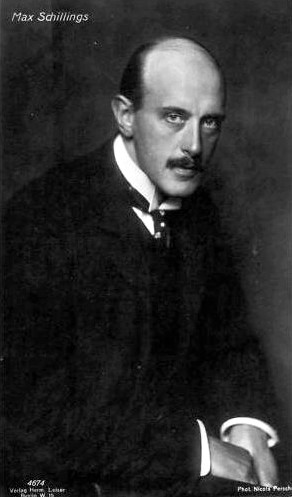Max von Schillings facts for kids
Max von Schillings (born April 19, 1868 – died July 24, 1933) was a German conductor, composer, and theater director. He was the main conductor at the Berlin State Opera from 1919 to 1925.
Schillings' opera Mona Lisa (1915) became famous around the world. It was even performed at the Metropolitan Opera in New York. Max von Schillings married Barbara Kemp, the singer who played the main character in Mona Lisa. Before this opera, he had already written three others: Ingwelde (1894), Der Pfeifertag (1899), and Der Moloch (1906).
Contents
About Max von Schillings
Max von Schillings was born in Düren, Germany. His brother was the photographer Carl Georg Schillings. Max started learning music early. He studied violin, piano, and music theory. He also went to school in Bonn. His music teachers were Caspar Joseph Brambach and Otto von Königslow.
Later, Schillings studied many subjects at the University of Munich. These included jurisprudence (law), philosophy, literature, and art history. On October 1, 1892, he married his cousin, Caroline Josefa Peill. They divorced in 1923. On June 11, 1923, he married the opera singer Barbara Kemp in Berlin-Charlottenburg.
Max Schillings became a professor on February 16, 1903. This was given to him by the Royal Bavarian government. In October 1911, the University of Heidelberg gave him an honorary Doctor of Philosophy degree. He also received a special award called the Ehrenkreuz. This award allowed him to use "von" in his name. So, he became Max von Schillings. In his hometown of Düren, a street was named "Schillingsstraße" after him.
In the 1890s, he worked as an assistant at the Bayreuth Festival. Later, he became a conductor and music teacher in Munich. From 1908 to 1918, he was the director of the Royal Court Theatre in Stuttgart. He then took over from Richard Strauss as director of the State Opera in Berlin. This was from 1918 to 1925. At the same time, he was also the music director for the summer Zoppot Forest Opera. In the late 1920s, he went on concert tours. He traveled across Europe and to the USA.
After returning to Germany, he became the President of the Prussian Academy of the Arts in 1932. He took over from Max Liebermann. From March 1933 until he died, Schillings was also the artistic director of the Städtische Oper Berlin. He passed away in Berlin in 1933 from a pulmonary embolism (a blood clot in the lung). His ashes were buried in Frankfurt-am-Main.
Max von Schillings wrote many different kinds of music. These included operas, melodramas, and pieces for choirs. He also wrote chamber music, violin and piano concertos, and symphonic poems. His most famous work is his opera Mona Lisa. It was first performed on September 26, 1915, in Stuttgart. This opera was one of the most performed in Germany until his death.
Schillings was known for teaching music. One of his most famous students was Wilhelm Furtwängler. He was also the person to whom Frederick Delius dedicated his work "Sea Drift."
Max von Schillings did not support the Weimar Republic (the German government at the time). He held strong prejudices against Jewish people. During his time as President of the Prussian Academy of the Arts, some important artists were removed or excluded. These artists included Käthe Kollwitz, Heinrich Mann, Ricarda Huch, Alfred Döblin, Thomas Mann, Max Liebermann, Alfons Paquet, Franz Werfel, and Jakob Wassermann. He also ended Arnold Schoenberg's teaching job at the Academy. In 1933, he made Franz Schreker retire early from his teaching role there.
Music He Wrote
Operas
- Ingwelde
- Der Pfeifertag
- Moloch op. 20
- Mona Lisa (1913/15, with words by Beatrice von Dovsky)
Melodramas
- Das Hexenlied, op. 15
- Kassandra
- Das Eleusische Fest
Concertos
- Violin Concerto in A minor, op. 25
- Violin Concerto in G minor, op. 38
- Piano Concerto Ein Totentanz op. 37 ("A Death Dance")
Chamber Music
- String quartet in E minor
- String quintet, op. 32
Other Works
- Glockenlieder ("Bell Songs"), op. 22
- Meergruß und Seemorgen (Sea Greeting and Lake Morning), op. 6
- Vier liederen aus der Wanderzeit ("Four Songs from the Wandering Time"), op.2
See also
 In Spanish: Max von Schillings para niños
In Spanish: Max von Schillings para niños
 | Bessie Coleman |
 | Spann Watson |
 | Jill E. Brown |
 | Sherman W. White |


